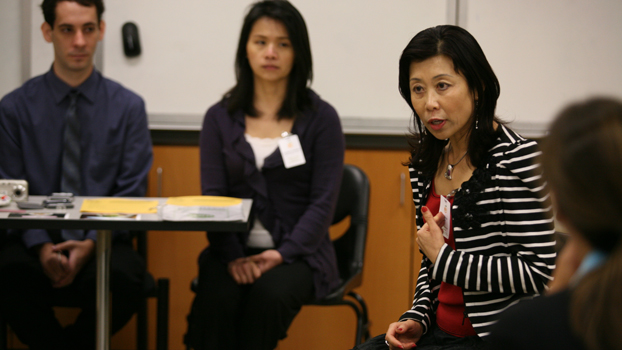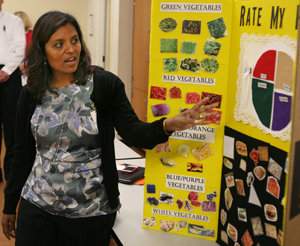 Caption: Jie Weiss, right, explains her research on parental decisions to feed their children healthy foods at Cal State Fullerton’s recent obesity prevention symposium. Photo: Greg Andersen Download
Caption: Jie Weiss, right, explains her research on parental decisions to feed their children healthy foods at Cal State Fullerton’s recent obesity prevention symposium. Photo: Greg Andersen Download
Target: Obesity
Researchers Reveal Prevention Strategies
How parents decide what to feed their preschool-age children, how to promote healthy lifestyles in elementary schoolchildren and how to get kids to exercise as ways to combat obesity were a few of the topics discussed at Cal State Fullerton’s recent “Obesity Prevention Through the Life Span: Reflections of the Past and Visions of the Future” symposium, sponsored by the university’s College of Health and Human Development.
 Caption: Archana J. McEligot explains an interactive nutrition guide. Photo: Greg Andersen Download
Caption: Archana J. McEligot explains an interactive nutrition guide. Photo: Greg Andersen Download
About 80 representatives from health care agencies, hospitals, clinics, nonprofit organizations and school districts attended to learn more about the research and community projects run by the university's Center for the Promotion of Healthy Lifestyles and Obesity Prevention. The goal, said event organizers Shari G. McMahan, dean of the College of Health and Human Development, and Jie Weiss, associate professor of health science, was to inform the public about the center’s work and to:
- disseminate results from obesity prevention and intervention projects;
- share lessons learned regarding collecting data on eating behaviors and physical activities in the community; and
- increase obesity prevention and intervention collaborations between the university and community groups.
“The prevalence of obesity in children has doubled over the past two decades,” McMahan said. “Intervention during the formative years is of utmost importance.”
Among the projects presented at the symposium were:
- “Un Regalo Para El Bebé,” a Spanish-language telenovela (soap opera), produced by CSUF professors and McMahan, that targets low-income Latinas with the message that breastfeeding helps combat obesity. According to research, children who have never been breastfed are 4.5 percent more likely than breastfed children to become obese. The Centers for Disease Control estimate that one in three children will become diabetic. The odds are worse for Latino children — nearly half will become diabetic. Studies show that U.S. Latinas recognize that breastfeeding is superior to bottle feeding, but that they face barriers such as embarrassment, difficulties with logistics and a perceived lack of support. After showing the telenovela to a group of low-income Latinas in Santa Ana, CSUF researchers reported positive outcomes regarding an increased comfort level in engaging in breastfeeding conversations, an increased belief that breastfeeding can prevent obesity and an increased understanding that breastfeeding should continue beyond one or two months.
- “Mothers’ Decision Making in Food Choices for Their Preschoolers.” Weiss reported that while parental goals, attitudes, cultural and situational factors related to feeding have been studied, little research investigates the factors as they relate to decision-making. She said parents generally are knowledgeable about the impact of their food choices on their children's health and they have the intention to feed children healthy food, yet they still make choices that ultimately place their loved ones at risk. Her research project examined Latino mothers' intentions for healthy feeding and the everyday decisions they make regarding meal choices. As a result, Weiss said, she developed a successful intervention plan in which mothers received daily digital motivational messages to inspire them to choose healthy meal choices for their kids.
- “Active Play At Home.” Daniela A. Rubin, assistant professor of kinesiology, and her colleagues are administering a home-based intervention that involves scores of families. The intervention consists of a six-month physical activity curriculum called Active Play At Home. It includes a combination of playground games and interactive console-based games. Parents are involved as key mediators for the completion of the program, Rubin said. http://calstate.fullerton.edu/inside/2011fall/Prader-Willi-research.asp
- “Rate My Plate.” Archana J. McEligot, associate professor of health science, provided an overview on the four food groups and how good nutrition can become a daily habit. She provided tips for creating a balanced diet in a simple interactive manner that was introduced to students at a recent health fair.
McMahan said the Center for the Promotion of Healthy Lifestyles and Obesity Prevention has been awarded grants totaling $573,187 since 2008 from the Centers for Disease Control to address childhood obesity through an interdisciplinary approach. As a result, the center’s projects involve myriad community groups and faculty members from across disciplines.
The center’s mission is to work with schools and other community-based organizations and agencies to: develop and test model health promotion programs and interventions, evaluate programs that support obesity prevention in the community and identify models and environments that can explain behavior patterns across different groups that are at risk of becoming obese. For more information on the center and its projects, visit the website.
June 4, 2012
